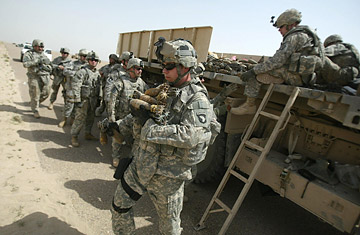
US soldiers unload projectiles as they are set-up to be detonated on the outskirts of Karbala, Iraq.
In the mind of U.S. officials, the emerging "troop withdrawal" deal between Iraq and the United States would apparently look much like the many agreements the U.S. has with other countries around the world hosting U.S. forces. But five years of war and occupation have left many Iraqi leaders reluctant to accept what the U.S. considers standard practice for U.S. forces overseas: immunity from prosecution in foreign courts. Iraqi Prime Minister Nouri al-Maliki himself suggested that blanket U.S. military immunity in Iraq was not in line with Iraqi visions for a new agreement governing the American military presence in the country, making the issue perhaps the single biggest stumbling block in the ongoing negotiations.
During a surprise visit to Baghdad last week, Secretary of State Condoleezza Rice sidestepped the question of whether the U.S. was considering an end to the immunity from prosecution enjoyed by U.S. troops in Iraq. "I'm not going to go into, obviously, the details of our negotiations," said Rice, who spoke to reporters alongside Iraqi Foreign Minister Hoshyar Zebari amid intensive negotiations over a long-term security pact. "We are working together as partners to make certain that we cover the concerns of both parties for sovereignty for the Iraqi Government," Rice added. "And so everything that we will do in this agreement will fully respect that sovereignty. We will look at how the arrangements will go forward. We have a number of agreements around the world. This is not unknown to people — how to negotiate the status of various forces on the soil of a sovereign ally. And so the agreement will be in accordance with those principles."
Exemption from prosecution for U.S. soldiers abroad has a long precedent in American policy and politics, as Rice noted. For decades the Pentagon has insisted that the military's own internal judicial system is the only place U.S. troops should be tried for alleged crimes while serving overseas. While that is a politically popular stance in the U.S., it been the source of tensions at times with allies such as Japan, Italy and South Korea that host large numbers of U.S. troops. In each of those countries U.S. troops over the years have been implicated in alleged crimes ranging from involuntary manslaughter to sexual assault, in cases that have often led to public outcry over military immunity. However, Washington has shown no signs of seriously rethinking the immunity question. Indeed, the specter of U.S. military personnel appearing in a foreign court after Sept. 11 led President Bush in 2002 to withdraw the tentative U.S. support for the International Criminal Court that had been offered by President Clinton during the last year of his tenure. That stance left the United States on the same side of the issue as other nations opposed to the ICC, such as Sudan, Iran and North Korea.
Few outside the human rights activist community have challenged this seemingly nonnegotiable U.S. position. But now voices inside Iraq are beginning to question whether U.S. military immunity can be tolerated by an ostensibly sovereign nation. The U.S. military presence in Iraq since 2003 has produced, in the eyes of many Iraqis, a lengthy list of alleged crimes by U.S. troops with scant signs of justice. Episodes include the Abu Graib prison abuse scandal in 2004 and the killing of 24 civilians by Marines in Haditha in 2005. Those cases and many other lesser known ones have gone to U.S. military courts. But few Iraqis view the distant proceedings as providing adequate accountability, especially considering the high number of acquittals and the paucity of convictions to date.
Moreover, many Iraqis would argue that these crimes are not the average and seemingly unavoidable incidents that accompany a significant military presence on foreign soil. In other words, it's one thing to deal with the occasional U.S. serviceman, normally sequestered on a large base, who winds up implicated in a criminal incident such as drunken driving, assault or even murder. It's quite another, however, to have thousands of troops fanned out across your country running prison camps and conducting military operations in a shooting war where much of the violence plays out among the civilian population.
Zebari, like Rice, avoided spelling out the latest thinking among negotiators on the question of immunity, saying "this issue, as you know, is also a sensitive issue that deals with sovereignty." But the Iraqi foreign minister made clear he at least thinks new rules will apply in the coming Status of Forces Agreement, or SOFA, which U.S. and Iraqi negotiators hope to complete before the end of the year. "What we have accomplished in this agreement is the most advanced version of any SOFA or strategic agreement between the United States and any other country in the world." Whether it strips American soldiers of immunity remains to be determined.
